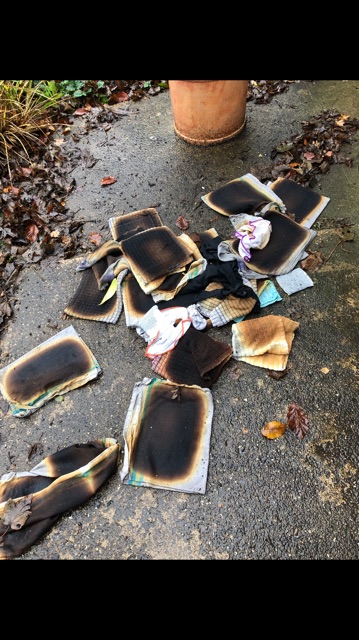An incident in which a pile of tea towels almost caught fire after being folded and piled straight out of the tumble dryer, has prompted warnings from Northamptonshire firefighters.
A photo was recently sent to Northamptonshire Fire and Rescue Service showing burn marks to a heap of tea towels, which had started to catch fire at their owner’s home.
The incident, which was not reported to NFRS, happened at a house in Daventry, in November.
The woman, who also runs a pub restaurant business in Northamptonshire and who does not want to be named, had taken tea towels home to wash before tumble drying them.
She took them out of the dryer and folded them before going out shopping. She returned less than four hours later to the smell of smoke in her house.
She said: “When we walked in, the stench of smoke was horrendous. We started running around and checking everything. Then I saw smoke coming from the pile of tea towels and I called to my husband. The smoke wasn’t coming from the top or bottom, just the middle section.
“I am so relieved we returned home when we did. The frightening part of it is what the consequences could have been if this had happened at night.
“I’m now more aware of what comes out of the tumble dryer and more cautious about tea towels. I immediately went out and bought lots of new tea towels. I just wanted to warn others to prevent it happening to someone else.”
Although the phenomenon of combusting tea-towels is very rare, there are nationally reported cases of significant damage being caused to different premises.
These types of fires happen when apparently clean tea towels containing residue fats or grease are taken from the tumble dryer and piled up, holding the heat still within the centre of the stack.
The combination of heat, cooking fats and oxygenating chemicals from stain removing detergent products can create a chemical reaction, causing towels to start smouldering and catch fire. When piled, heat has nowhere to escape, which can result in the ignition point being reached.
Scott Richards, Community Protection Manager at NFRS, said these incidents are rare but can pose a risk, predominantly to commercial or business premises such as restaurants, care homes and pubs. This is due to the restricted timescales required for cleaning and drying operations to be completed and the high frequency at which this task is carried out. However, this could happen at any location if grease has built up sufficiently in towels being washed and tumble dried.
He said: “Although we did not attend this particular incident, judging by the photos, the lady involved was extremely lucky the incident was not much worse. We know that other fires with the same cause have had significantly worse consequences elsewhere in the country. Our advice is it is always better to be safe than sorry, if you believe there is a fire in your house or property or, as in this case, you can see smoke but you are not sure of the source, call the fire service.
“These fires are particularly shocking as they are so rare and unexpected – who expects a pile of tea towels with no apparent flame nearby to suddenly catch fire?
“We would like to warn people that this type of incident does and can happen, but also take the opportunity to highlight the more common risks that are unfortunately experienced . Here are steps that can be taken to avoid fires breaking out.”
Tumble dryer use: prevention tips
- Avoid placing freshly dried laundry which may have come into contact with greases or fat into stacks or piles.
- Ensure laundry has an opportunity to cool down before it is folded. Air it first before folding, to allow the heat to escape.
- Always wash tea towels/other similar purpose cloths on a hot wash.
- Do not leave damp washing in a hot or warm tumble dryer.
- Check the manufacturer’s instructions to ensure correct and proper use on a day to day basis but also understand any periodic checks or maintenance tasks that are required.
- Ensure all filters are cleaned as required, there may be more than just the one inside the door which collects the fluff.
- Overloading a machine can create additional risks of fire, due to the motor having to work harder.
- If the machine is within a commercial premises, ensure you understand the checks and testing needed and make sure arrangements are in place, either by staff or a contractor, to undertake the required action. Don’t assume someone else is doing the job.
- If you believe for any reason that the machine is not working correctly or there is a fault, have it checked by a qualified person.








 Fire Risk Assessment (worked example for House in Multiple Occupation (HMO)) (PDF 389KB)
Fire Risk Assessment (worked example for House in Multiple Occupation (HMO)) (PDF 389KB)
